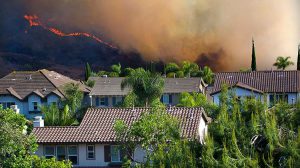Running your own business is an exciting, fulfilling adventure. But with great rewards come significant risks—and fire is one of the most devastating threats a small business can face. Protecting your physical assets, employees, and livelihood from such a disaster isn’t just smart—it’s essential. Fire insurance can be a true lifesaver for entrepreneurs, startups, and small business owners, offering not just coverage but peace of mind.
This guide breaks down the importance of fire insurance, the types of policies available, and how to choose the right one for your business. You’ll also discover tips for fire prevention and real-life success stories that illustrate how fire insurance has saved businesses like yours.
Why Fire Insurance Matters for Small Businesses
Imagine building your dream business over years—investing in equipment, setting up the perfect workspace, and cultivating a loyal customer base—only to face a fire that wipes it away in minutes. Could your business recover quickly (or at all) without financial support?
A fire can result in massive property damage, business interruption, and even employee injuries. According to the National Fire Protection Association (NFPA), U.S. fire departments respond to over 37,000 fires in businesses and offices annually. Small businesses are particularly vulnerable due to limited resources and tighter financial margins.
This is where fire insurance steps in. Fire insurance provides financial coverage to repair damages, replace lost inventory, and even cover lost income while you rebuild. Without it, many businesses simply cannot afford to recover from such a catastrophe.
Types of Fire Insurance Policies for Small Businesses
Not all fire insurance policies are created equal. Here’s an overview of the most common types of fire insurance policies designed for small businesses:
1. Basic Fire Insurance
This is the most straightforward option, covering damages caused by fire to your property, equipment, and contents. However, it may not include coverage for fire-related business interruptions.
2. Comprehensive Property Insurance
This policy covers fire damage but includes broader protection for other risks such as theft, vandalism, and natural disasters. It’s a great option if you want all-inclusive safety for your assets.
3. Business Interruption Insurance
This policy is a lifeline for businesses that rely heavily on consistent operations. It covers the loss of income due to suspended business activities caused by fire or related damages.
4. Specific Fire Perils Insurance
It targets certain high-risk areas, such as a kitchen in a restaurant or warehouses storing flammable goods. This tailored coverage ensures peace of mind for businesses with unique needs.
Understanding what’s included (and excluded) in each type of policy is crucial. For example, some policies may not include electrical fires or wildfires, so read the fine print and ask your provider for complete clarity.
Pro Tip
Combine fire insurance with a general liability or business owners’ policy (BOP) to ensure well-rounded protection at a more cost-effective rate!
How to Choose the Right Fire Insurance Policy
Selecting a fire insurance policy isn’t a one-size-fits-all process. Here’s how you can find the best coverage for your business:
1. Evaluate Your Risk Exposure
Identify key vulnerabilities in your business. Are you operating in an area prone to wildfires? Do you have expensive machinery that needs full replacement? Understanding risks will help you choose coverage tailored to your needs.
2. Analyze Your Business Assets
Take an inventory of your property and its value, including furniture, fixtures, equipment, inventory, and the building itself. This ensures you purchase enough coverage to replace or repair everything after a fire.
3. Compare Providers
Research multiple insurance providers and policies. Look for features like 24/7 claims support, fast payouts, and good customer reviews. Ask a lot of questions—never hesitate to dig into details!
4. Understand Policy Add-Ons
Does the policy include things like debris clean-up, smoke damage, or relocation expenses? These “extras” can make a big difference when disaster strikes.
5. Consider Business Continuity Plans
Look into a plan that includes business interruption coverage, so you’re not losing revenue for weeks or months during repair work.
Real-Life Success Stories of Fire Insurance Saving Small Businesses
Case Study #1 – A Bakery’s Quick Comeback
When Jenna’s artisan bakery suffered an electrical fire, her fire insurance policy covered the $75,000 equipment damage and even offset her lost income while she waited for repairs. Less than two months later, Jenna’s bakery was up and running—and thriving again!
Case Study #2 – Redeeming a Retail Space
A boutique clothing store owner named David faced a tragic ordeal when a freak fire gutted his retail space. Thanks to his comprehensive policy, not only were damages covered, but insurance paid for his temporary moving costs, allowing him to continue operations in a rented space while repairs were made.
These stories illustrate why fire insurance is more than a piece of paper—it’s a safety net.
Fire Prevention Tips for Small Businesses
Fire insurance is essential, but prevention is even better. Reduce your fire risks with these proactive measures:
- Install Smoke Detectors and Fire Alarms: Ensure these are tested regularly.
- Fire Extinguishers: Place them in easy-to-reach areas—train employees on how to use them.
- Regular Inspections: Check electrical wiring, heating equipment, and sprinkler systems to ensure they’re in top condition.
- Safe Storage: Keep flammable materials stored away from heat sources.
- Create an Emergency Plan: Train your team on evacuation procedures and conduct fire drills periodically.
Remember, prevention and preparation go hand-in-hand with insurance.
FAQs About Fire Insurance for Small Businesses
How much does fire insurance cost?
Costs vary depending on factors like location, business type, and the assets being protected. On average, small businesses in the U.S. spend $400–$1,200 annually for a fire insurance policy.
Are all fires covered under fire insurance?
Not necessarily. Certain events, like intentional fires or arson by the policyholder, are excluded. Natural disasters like wildfires may require additional riders.
How fast can a claim be processed?
Claim timelines depend on the provider, but many aim to process claims in 1-2 weeks, provided all documents are in order.
Can landlords’ insurance cover my business space?
No. Landlords’ insurance covers the building, not your business assets. Small business owners should have their own fire insurance policy.
Protect Your Business Today
Running a business is an act of hope and determination. But to thrive, hope alone won’t cut it—preparation is key. Fire insurance doesn’t just protect your business; it protects your dream, your employees, and the future you’re building. Don’t wait for the unexpected—securing coverage is one of the most sustainable choices you can make for your business.
It’s time to take action. Assess your fire insurance needs today and ensure your business is ready to face any challenge. The right policy, paired with proactive safety measures, ensures you keep brewing your success story even after life throws its curveballs.



